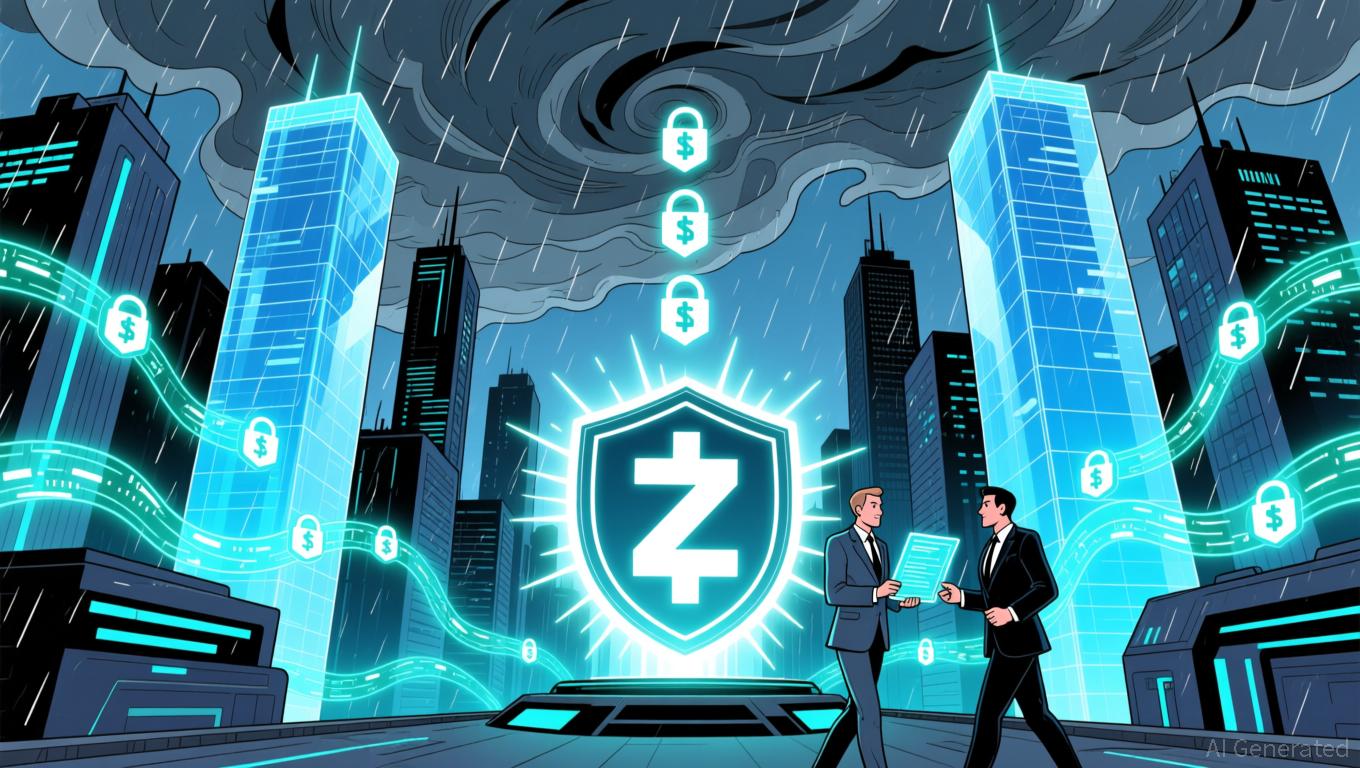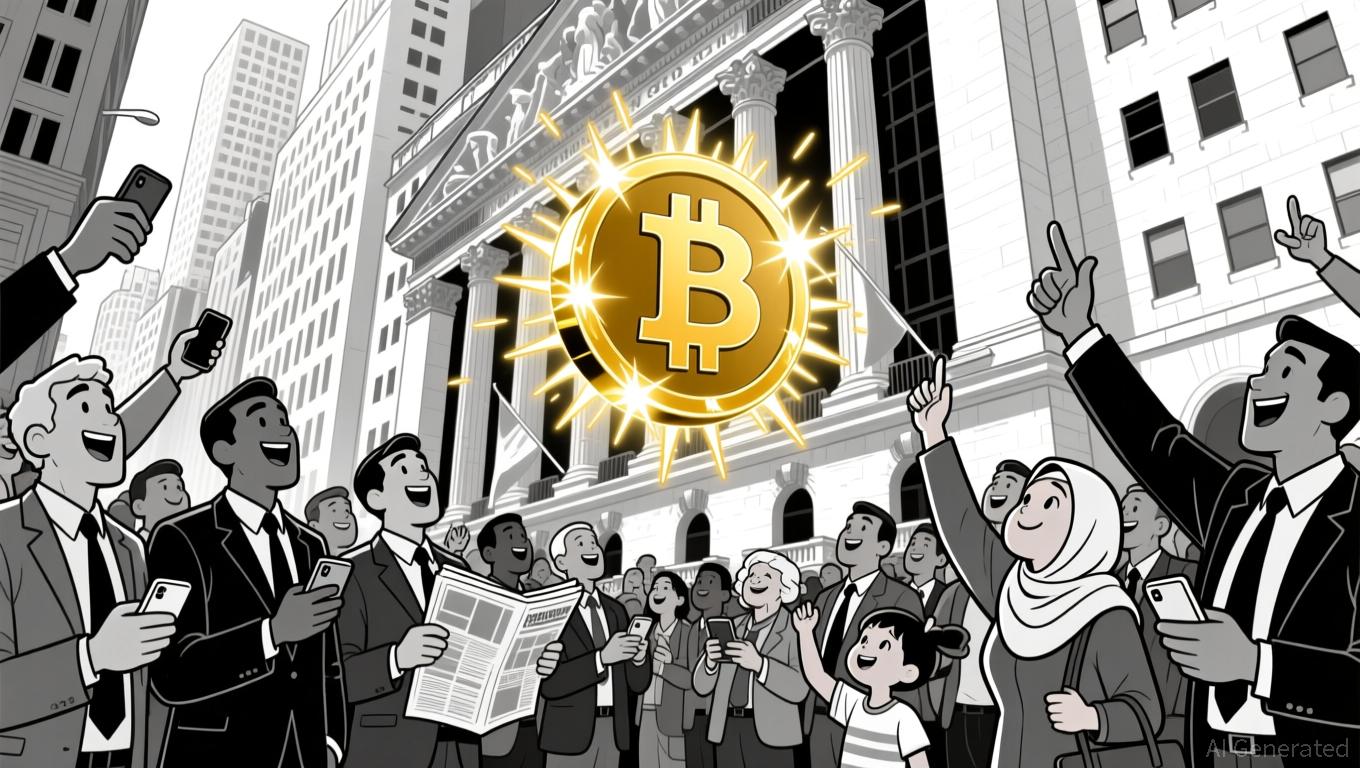Zcash News Today: Zcash's Approach to Privacy: Is It a Partner or Rival to Bitcoin in the Changing Crypto Landscape?
- Zcash (ZEC) leads privacy coin resurgence in 2025, generating $47.5M in fees (560% surge) and ranking fourth globally in blockchain fee share. - OKX relisting triggered 12% price jump to $600, fueled by quantum-resistant upgrades, Winklevoss-backed $150M investment, and U.S. regulatory shifts. - Privacy coin debate intensifies: critics warn Zcash could split Bitcoin's institutional support, while proponents highlight its quantum-safe governance and 11,590 daily active wallets. - Emerging rivals like Ghos
The Resurgence of Privacy Coins in 2025
In 2025, privacy-focused cryptocurrencies are regaining prominence, with Zcash (ZEC) distinguishing itself as a leader in a sector that has often been eclipsed by broader crypto market movements. As a layer-1 blockchain prioritizing privacy, Zcash has climbed to the fourth spot globally for transaction fee generation, collecting $47.5 million in fees over a 30-day period—a remarkable 560% surge that surpasses established networks like Ethereum and Solana. This renewed momentum reflects a shift in both institutional and retail interest, as privacy protocols adapt to changing regulations and technological progress.
Strategic Moves and Market Impact
Zcash’s comeback is driven not only by increased on-chain activity but also by astute market strategies. The token’s relisting on major exchanges such as OKX in November 2025 sparked a 12% price jump to $600, outperforming Bitcoin during a time of market turbulence. Experts attribute this growth to a blend of quantum-resistant technology upgrades, a rise in institutional participation, and evolving U.S. regulatory attitudes, with the new SEC leadership showing greater openness to privacy features. Supporting this narrative, Cypherpunk Technologies—a company backed by the Winklevoss twins—has acquired 1.43% of Zcash’s circulating supply, now valued at $150 million.
Ongoing Debate and Technical Advancements
The role of Zcash within the crypto ecosystem remains a topic of debate. Some, like Bloomberg’s Eric Balchunas, caution that Zcash could fragment institutional support away from Bitcoin. Others, including VanEck’s Jan van Eck, believe Zcash complements Bitcoin by addressing privacy shortcomings, as highlighted in recent analyses. Technically, Zcash’s quantum recovery protocol enables seamless upgrades without disrupting transactions, setting it apart from Bitcoin’s slower governance model, as noted in technical assessments. Zcash’s growing utility is further evidenced by its 11,590 daily active wallets and a network hashrate approaching record levels.

Questions of Sustainability
Despite its impressive performance, concerns about Zcash’s long-term sustainability persist. Critics highlight potential “exit liquidity” strategies, including misleading headlines about exaggerated price predictions from Fidelity analysts. Additionally, short positions make up 55% of ZEC’s open interest, with large holders incurring high costs to maintain these bets, according to market research. Nevertheless, Zcash’s ability to account for 2.6% of all blockchain transaction fees in November 2025—surpassing even Ethereum—demonstrates that its privacy features continue to attract users amid increasing regulatory oversight.
Emerging Competition in the Privacy Sector
Zcash’s leadership in the privacy coin arena is being tested by innovative newcomers. GhostwareOS (GHOST), a privacy platform built on Solana, has launched GhostPay, a modular payment system that distributes transaction fees directly to token holders. With features like encrypted messaging and identity-masking tools, GhostwareOS is positioning itself as a strong rival to both Zcash and Monero (XMR). The privacy coin market, now valued between $18 and $19 billion, is increasingly shaped by high-performance solutions rather than older protocols.
The Future of Privacy Coins
Looking ahead to 2026, privacy coins are moving from the periphery to the forefront of the cryptocurrency narrative. Whether Zcash can retain its dominance or yield ground to innovative platforms like GHOST will depend on its ability to balance institutional interest with ongoing technological development. One thing is clear: as transparency becomes the norm, the appetite for financial privacy is not diminishing—it is growing stronger.
Disclaimer: The content of this article solely reflects the author's opinion and does not represent the platform in any capacity. This article is not intended to serve as a reference for making investment decisions.
You may also like
BCH Rises 0.09% as Momentum Fuels Outperformance
- BCH rose 0.09% in 24 hours but fell 4.22% in seven days, yet gained 22.72% annually. - It outperformed its Zacks Banks - Foreign sector with 0.66% weekly gains vs. -2.46% industry decline. - Earnings estimates rose twice in two months, boosting consensus from $2.54 to $2.56. - With a Zacks Rank #2 (Buy) and Momentum Score B, BCH shows strong momentum potential. - Annual 63.46% gains and positive revisions solidify its position as a top momentum stock.

DOGE drops 1.36% as Bitwise ETF debuts
- Bitwise launched the first Dogecoin ETF (BWOW) on NYSE, offering institutional-grade exposure to the memecoin. - DOGE fell 1.36% in 24 hours but rose 7.34% weekly, reflecting mixed short-term market sentiment. - The ETF aligns with growing institutional adoption and regulatory momentum for altcoins, despite a 52.35% annual decline. - Similar products like Bonk’s ETP and Ethereum upgrades highlight maturing crypto infrastructure and investor demand.

ZEC Falls 4.01% After Grayscale Submits Zcash ETF Conversion Application
- Zcash (ZEC) fell 4.01% in 24 hours as Grayscale files to convert its Zcash Trust into an ETF. - The ETF conversion aims to boost institutional exposure and regulated market access for ZEC. - ZEC shows 16.26% monthly gain and 736.04% annual rise despite recent 17.89% weekly drop. - Analysts highlight ETF approval could stabilize ZEC’s price and attract diversified investors. - The SEC’s decision on the ETF remains pending, shaping market perceptions and ZEC’s adoption trajectory.

Algo Falls by 0.69% as Market Fluctuations and Ongoing Downtrend Persist
- Algo (ALGO) fell 0.69% in 24 hours to $0.1434, contrasting with 5.52% weekly gains but a 57.16% annual decline amid crypto market uncertainty. - Switzerland delayed CARF crypto reporting rules until 2027, citing stalled international data-sharing talks, hindering global regulatory alignment. - Bonk (BONK) launched Europe's first ETP on SIX Swiss Exchange, enabling traditional investors to access memecoins without digital wallets. - Ethereum prepares December 3 gas limit upgrade to 60M, enhancing layer-2
